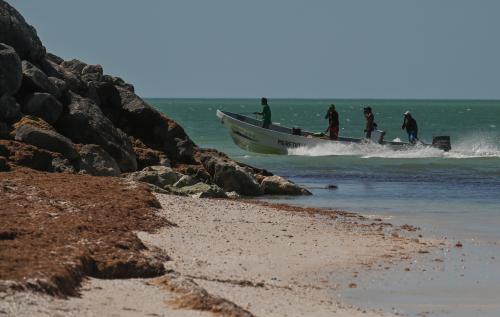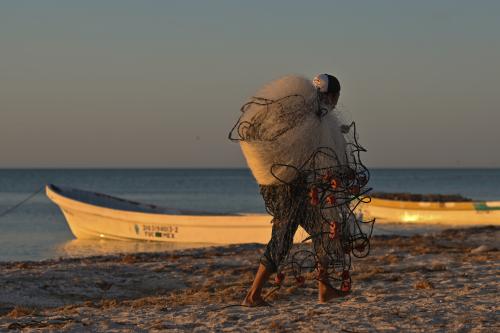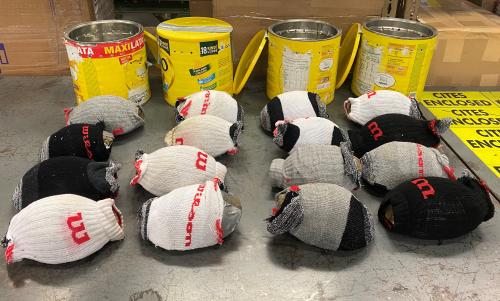Based on her recent fieldwork to Mexico, Vanda Felbab-Brown highlights 14 women fishers from La Paz, Baja California Sur who overcame their marginalization and their fears to become empowered and impactful guardians of a mangroves ecosystem. This piece was originally posted by Mexico Today.
March celebrates women and their vital role in politics, economy, society, and family. So I left my last oped in a three-part series on the takeover of Mexico’s fisheries by organized crime for an uplifting, if not trouble-free, story to March: It is the story of 14 women from La Paz, Baja California Sur who overcame their marginalization and their fears to become empowered and impactful guardians of a mangroves ecosystem. Unlike my other interlocutors in Mexico who spoke with me about legal and illegal fishing and the organized crime takeover of the industry, these women agreed their names and location could be disclosed.
Most of these women are wives or close relatives of fishermen. For years and sometimes decades, their husbands, fathers, brothers, and sons have been fishing, sometimes legally, often illegally. Some years ago, environmental NGOs began working with the community to reduce illegal offtake and encourage sustainable fishing and aqua-culture businesses.
The women readily took to the idea of sustainability and legal fishing and became some of its most first and most dedicated supporters. They often had to argue long and hard to persuade their male relatives who did not want to give up illegal fishing and who were distrustful of the NGOs to participate in the legal sustainable fishing efforts. Without the women’s role in building support in the community for legal fisheries efforts, the projects might not have taken off at all.
But when the projects actually started looking like they would be a success, the women discovered – to their bitter disappointment – that the men did not want them to play any significant role in the now promising-looking business.
“There was no space for us, after we worked so hard, it was really painful,” one of the women told me on a warm night when we met in La Paz in November 2021. “The men just didn’t want us in, even though some were our husbands, brothers, and fathers,” another chimed in.
They persevered in their demands to be accorded a role in the business. In 2017, they finally managed to get accepted into the fisheries cooperative. But they were disappointed once again: they were paid only one third of the salary the men in the cooperative awarded themselves for the same jobs. This salary discrimination took place despite the fact that “we [the women] were the ones taking advantage of the capacity-building and training programs for the aqua-culture projects the NGOs provided. The men mostly ignored the training. We actually had better skills, and yet they gave us only one third of the wage,” she continued. “It was really hard for women in the cooperative, we were seen by the male members as a problem. We saw that being only in a defensive mode wasn’t going to work. So we decided to find our own space where we could run our own sustainable aqua-projects.”
But the only space that was available to them was a dark, dirty, and dangerous place, a location of illegal drug dealing, drug use and illegal fishing. It was the Conchalito mangroves in La Paz.
Determined and undeterred, the women decided to clean up the mangroves of litter, illegal fishing, and drug dealing — a task of many challenges and risks.
Like in an allegorical metaphysical drama, they had to confront their fears – by literally going into a dark wooded swamp, night after night after night.
They started by collecting the piles of trash many of the local people dumped into the mangroves. They even took on caring for the dogs that roamed the estuary, so they were well-fed, clean, and disease and aggression-free.
With immense courage, the women also began patrolling the mangroves at night and confronting the drug dealers, telling them to move their illegal dealings elsewhere. Of course, the drug pushers did not just give up – they would show up with cars and armed men. They would menace the women and chase them around the mangroves, often forcing them to escape into the southern part of the estuary inaccessible to vehicles, sometimes firing their guns as the women tried to hide among the mangroves. Facing violent threats to their lives, many of the women were ready to give up. But Chela, who emerged as the leader, urged them not to: “I said if we wanted to end illegal fishing and drug leading here, we had to come to the estuary every day, every night, despite the shooting, despite the threats,” she told me as the other women nodded their approval. Despite many requests, they received no support, no backup from the municipal or state police.
On their own, the women persevered. Despite their fears, the women also took on the illegal fishers – many of them, in fact, their relatives. They started confiscating all gear used by the illegal fishers, hiking deep into the tangled and difficult-to-penetrate mangrove forest to counter all of the illegal fishing operations. When the women started their enforcement against illegal fishing in 2017, they counted 6,000 shells of scallops from the illegal fishing. After a year of their patrolling efforts, the illegal harvest – as well as presence of illegal fishing gear – declined by 90 percent. The team wanted to celebrate success, but Chela protested: The only time to celebrate was when they have ridden the mangroves of all illegal fishing and drug dealing, when the mangroves became crime free. So she persuaded the rest of the group to start coming in even earlier and staying later at night in the mangroves.
“We didn’t have any guns or cars, only our bodies and courage, and Chela’s leadership. And we did it!”, one of the women expressed proudly.
Restoring the mangroves and developing their own aqua-culture also meant confronting their male relatives and overcoming the fear of going against them and provoking major strife, perhaps even domestic violence, in the families that would also affect their children. The men did not want them to go out into darkness, to challenge the narcos, to counter their own illegal businesses.
And with choosing to oppose their male relatives also came perhaps the biggest challenge, one of the women confided — overcoming fear of each other and learning to trust one another: “A lot of the illegal fishers were members of our own families, our sons and husbands, and fathers and brothers. At first, we weren’t sure which one of us would betray us. We were suspicious of each other, the more our relationships with our husbands and fathers and brothers became difficult, the more distrustful of each other we became.” Recovering from and overcoming the distrust took renewed leadership and purposeful team-building and solidarity-enhancing activities.
Their courage, leadership, and perseverance amazingly paid off: Conchalito became free of trash, rabid dogs, drug leaders, and illegal fishing. Fourteen courageous and dedicated women transformed the mangroves from a hotpot of local criminality into a place of safety where even little children and families safely go to play. “We got respect from the local people,” one of the women explained. “We became acknowledged as the Guardianas de Conchalito. And we got them to respect the mangroves, as a nursery for fisheries,” as a nursery for their own children and future. One of the women, Marta, is teaching the kids who now come to play into the Conchalito mangroves about environmental sustainability and protection.
With local respect also came other forms of authority. Municipal government officials and the various police forces who had been ignoring their requests for support became more responsive. Mexico’s nationalProcuraduria Federal de Proteccion al Ambiente (PROFEPA), the Mexican agency responsible for enforcing environmental laws, gave them official certification as guardians of Conchalito.
But the new mangrove paradise is hardly free of challenges and troubles.
For one, the women lack funding. Since they are not legally registered as an organization, they cannot receive funds and only a few NGOs indirectly support them.
Which raises the second thorny issue: Should the women declare their own independent business, including in the high-value scallop aqua-culture, and formally separate from the broader organization that also includes men? The women’s work to clean up Conchalito was in preparation for running their own economic projects and obtaining economic independence from and equality with the men. To that purpose, the women have been undergoing various training: Chela, the leader, got a diving certificate; Claudia learned about scallop fisheries; others beefed up their skills in accounting and business management. They have other ideas beyond the aqua-culture businesses: They would like to become birdwatching and ecotourism guides.
But now that the prospect of their own aqua-culture business became viable, the men from the sustainable fisheries organization do not want the women to split off and run their own competing business. “First, they didn’t want us in, now they don’t want us out, and that’s reopening all of the family disputes again,” one of the women explained. Some of the women are also afraid that if they run their own business and don’t succeed, the men will not allow them back into their business cooperative and they will lose even the unsatisfactory but still meaningful income they are obtaining there.
Only the broader organization, dominated by the men, has legal permits for fishing and aqua-culture businesses, and the women are not sure what kind of bureaucratic, corruption, and unfair business practices obstacles they will face when applying for their own permit.
The men also own all the equipment the women need, such as boats and diving equipment, and for which the women currently lack financial capital.
And an even more ominous cloud is moving over the mangroves – organized crime. As I described in this series and detail in an end-of-March Brookings Institution report on wildlife trafficking in Mexico, Mexican criminal groups, such as the Sinaloa Cartel and Cartel Jalisco Nueva Generación, are taking over many legal and illegal economies in Mexico, fisheries. They are threatening fishers, including artisanal ones and local cooperatives, and other aspects of fisheries in La Paz too. Their violence is far more intense and merciless than that of the local drug dealers whom the women successfully pushed out of the mangrove. Some of the women hope that Conchalito and any eventual business of theirs there may be small fry for the cartels and that the cartels will just ignore Conchalito.Sadly, abstaining from targeting small local enterprises has not been the business model of either cartel.
The women don’t want to surrender to organized crime, but how will they be able to resist the cartels? They don’t know. “We brought light and life to the dark mangroves,” one of women concluded our conversation. “But the work in the mangroves also brought light and life to us, it gave us confidence we never knew we had to confront many fears and take on even our own partners. Will the narcos now take it all away from us? We can’t let them.”
The Brookings Institution is committed to quality, independence, and impact.
We are supported by a diverse array of funders. In line with our values and policies, each Brookings publication represents the sole views of its author(s).







Commentary
Op-edThe women guardians of Conchalito – Organized crime is taking over Mexican fisheries, part III
March 21, 2022